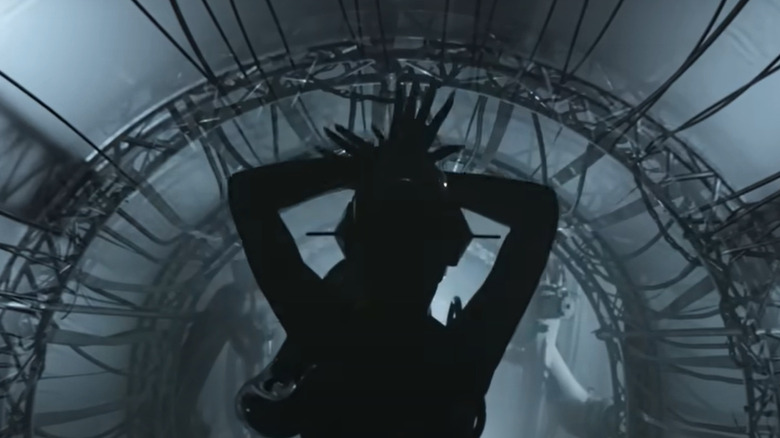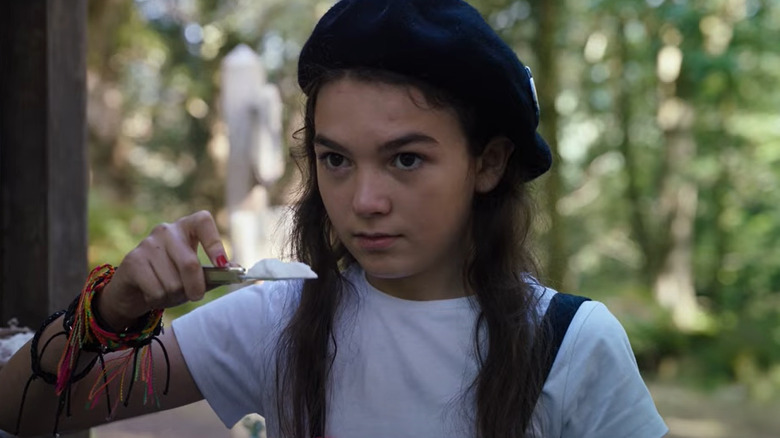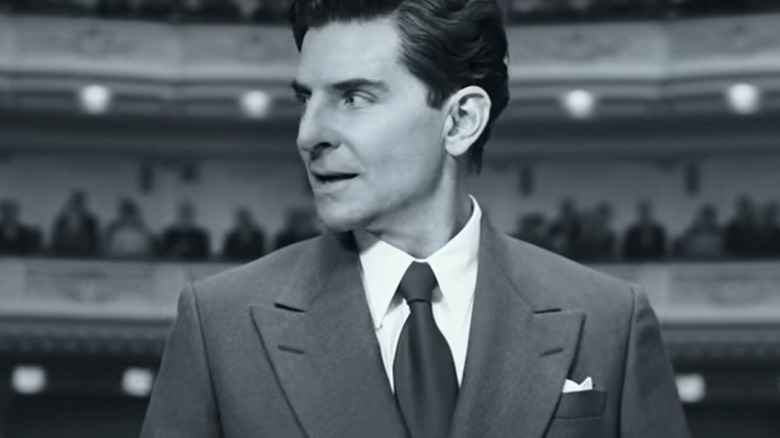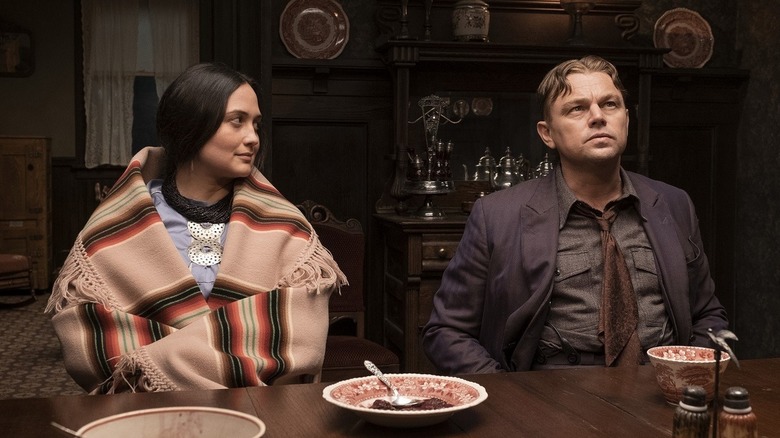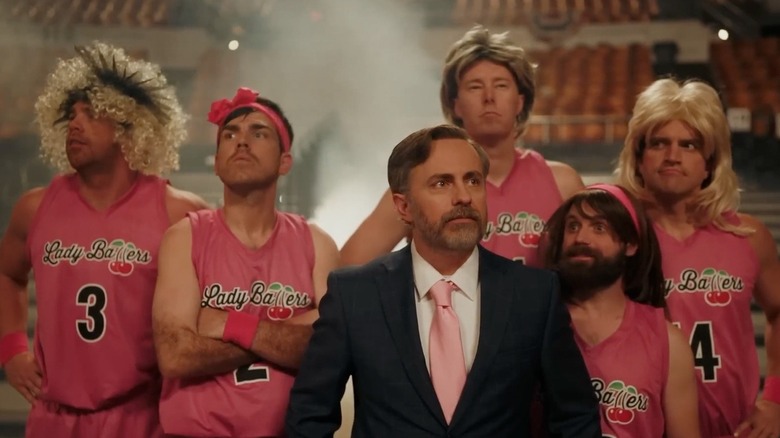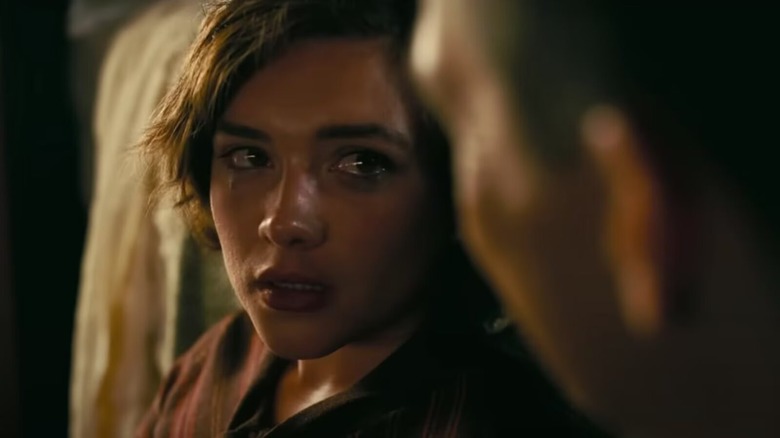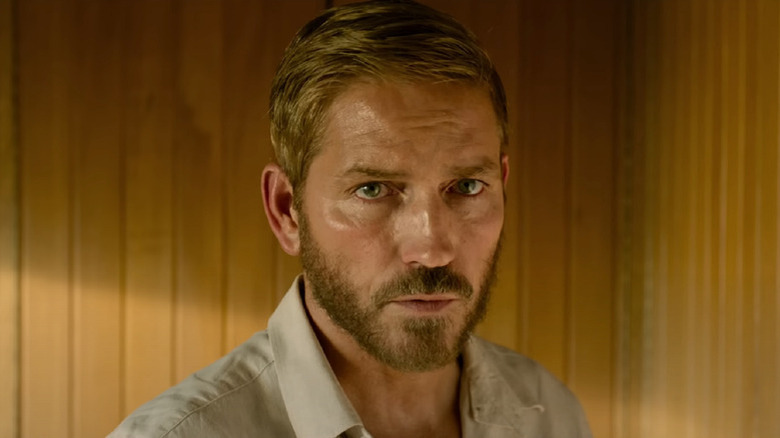10 Most Controversial Movies Of 2023
Art is controversial by nature. Whether it's film, television, music, or literature, every medium under the sun seeks to challenge viewpoints, provoke emotions, and incite debates among people who are willing to engage. 2023 has been a big year for controversial moments, with several movies polarizing viewers and forcing filmmakers to defend their creative decisions. Some films even drew the ire of politicians and influenced legislation, proving that art can change the world for the worse.
Everyone's mileage varies when it comes to controversy. One person's outrage is another person's comedy. Someone's passionate cause falls on deaf ears elsewhere. The films selected here cover various controversies, from the silly to the severe, but they all made headlines for notable reasons. Our picks include everything from bears-on-blow capers to feminist doll flicks, confirming that controversy can arise from the most unexpected places. Not every film listed here set out to have the impact it did, whereas others arguably tried too hard to ruffle feathers. However, they all had an effect on this year's pop culture zeitgeist. With that in mind, here are the 10 most controversial movies of 2023.
Renaissance: A Film By Beyoncé
Beyoncé's "Renaissance," a documentary that chronicles the singer's hit tour of the same name, has been praised as an ode to liberation, Black pride, and queerness. Conversely, the decision to screen the film in Israel polarized the pop star's fan base, with pro-Palestinian supporters urging her to withdraw it from theaters in the country.
The response to the film has raised some interesting questions about the role of celebrities in culture, too. Beyoncé's silence over the Israel-Palestine conflict has made some commentators question if she believes in what she preaches in "Renaissance," a film where she talks about her desire to create safe spaces for everyone. However, her seeming reluctance to address topical real-world issues has made her words feel empty in some circles.
At the same time, is it a celebrity's job to comment on perceived socio-political injustices? Or are big stars held to unreasonably high standards by their fans? "Renaissance" has inspired some thought-provoking discourse that asks these questions, making it one of this year's most divisive movies.
Cocaine Bear
Most people went into "Cocaine Bear" expecting a grizzly good time. The title says it all: it's about a bear going on a violent, drug-fueled rampage through a forest. What's not to love? Apparently, it's the scene where the film's two child characters, Dee Dee (Brooklynn Prince) and Henry (Christian Convery), try the titular narcotic after discovering a bag full of it in the woods.
The horror comedy, directed by Elizabeth Banks from a script by Jimmy Warden, pits Dee Dee and Henry in plenty of perilous situations. However, this particular scene riled up viewers who felt that child characters shouldn't sample Class A drugs in movies (even though being stalked by killer bears is fine). Fortunately, the kids survive the ordeal and return home safely, albeit with more life experience.
Banks stood by the creative decision despite the outcry, telling Variety that the film wouldn't have been as effective if the children were older. "We all kind of held hands, and we were like, 'Guys, they've got to be 12,'" she explained. "It's their innocence being tested." Producer Christopher Miller also defended the scene in the same interview, explaining that it was supposed to illustrate the children's naïveté: "It doesn't work if they're teenagers."
Maestro
Bradley Cooper's "Maestro" is a biopic about Leonard Bernstein, the legendary Jewish composer and conductor behind "West Side Story" and other award-winning hits. Most people would agree that Bernstein's story deserves to be immortalized on the screen. Still, some critics of the film took issue with Cooper — who also directed the movie — playing the main character instead of giving the role to a Jewish actor.
"Maestro" has also been accused of promoting negative stereotypes, with Cooper's large prosthetic nose being central to most of the backlash surrounding the film. An X (formerly Twitter) account called @StopAntisemitism summed up this viewpoint, writing, "Hollywood cast Bradley Cooper — a non-Jew — to play Jewish legend Leonard Bernstein and stuck a disgusting exaggerated 'Jew nose' on him." Meanwhile, Jake Gyllenhaal, an extremely talented Jewish actor, lost out on the rights to make the biopic.
Cooper responded to the "Maestro" controversy, noting that he expected the backlash to happen. The actor-director assured critics that he went into the project with the best intentions, stating that it was born out of love for Bernstein. The composer's family also defended the prosthetic nose and supported Cooper during the height of the debate.
Killers of the Flower Moon
Martin Scorsese's "Killers of the Flower Moon" flopped at the box office, but its rave reviews suggest that it will generate plenty of buzz during awards season. The Western true-crime epic, based on David Grann's book of the same name, tells the story of the systematic slaughter of Osage Nation members for their land in the 1920s. The subject matter makes the film inherently upsetting, but was Scorsese the right man for the job?
Despite consulting with the Osage Nation during production of the film, Scorsese and Eric Roth's adaptation divided Indigenous viewers. The movie's critics felt that the Indigenous characters were underwritten and stereotypical, noting that it wasn't the type of story that should be told by white filmmakers. "Reservation Dogs" star Devery Jacobs torched "Killers of the Flower Moon" for this reason, arguing that the Osage characters were dehumanized and not portrayed as three-dimensional human beings with honor and dignity.
But "Killers of the Flower Moon" was also praised by Indigenous commentators for giving prominent roles to deserving actors and highlighting real-life atrocities. However, while Scorsese's film might have been well-intentioned in many ways, its naysayers still believe that a story of this ilk should be told from a Native perspective.
Gran Turismo
You might be asking why a seemingly innocent movie centered around a popular video game franchise is one of 2023's most controversial films. Well, "Gran Turismo" is based on a true story with some tragic moments, which the film doesn't address with accuracy. Director Neill Blomkamp's sports drama chronicles the rise of Jann Mardenborough (Archie Madekwe), a "Gran Turismo" player whose love for the games inspires him to become a professional racer. His road to success is paved with obstacles, though, including dealing with an unfortunate death.
In 2015, Mardenborough crashed his Nissan GT-R Nismo GT3 while competing in the VLN Endurance Championship. The accident led to one spectator being killed while others were injured. In the film, the accident is presented as a pivotal moment for Mardenborough in his quest to become a racing star, which isn't true at all. He was already established when the accident occurred. "Gran Turismo" also reimagines the crash as taking place before Mardenborough's triumphant third-place finish at the 24 Hours of Le Mans — except that his Le Mans victory took place in 2013, two years prior to the crash.
It isn't uncommon for filmmakers to take liberties with true stories for creative or dramatic purposes, but this example has been lambasted for being tasteless. It reframes an actual tragedy to accommodate the protagonist's "hero's journey," and critics believe the film is disrespectful toward victim Andy Gehrmann and his family.
Lady Ballers
In 2021, The Daily Wire joined the entertainment business to ostensibly battle liberal Hollywood in the culture war. The media outlet, fronted by Ben Shapiro and Jeremy Boreing, intended to make and distribute content that embraces conservative values. This has resulted in everything from action thrillers about school shootings ("Run Hide Fight") to Western flops starring Gina Carano ("Terror on the Prairie"). "Lady Ballers," meanwhile, is a comedy that mocks contemporary gender debates with the goal of inciting outrage.
Directed by Boreing from a script he co-wrote with Brian A. Hoffman and Nick Sheehan, "Lady Ballers" is about men who dress up in wigs to dominate women's sports. Boreing plays Rob Gibson, a down-on-his-luck basketball coach who recruits the team in question. Anti-trans pundits such as Matt Walsh, Candace Owens, Senator Ted Cruz, Jordan B. Peterson, and Shapiro also appear in cameo roles, suggesting that the movie wants to make a statement.
The "Lady Ballers" promotional campaign described it as "The Most Triggering Movie of the Year," which should tell you everything you need to know about the type of film it wants to be. Boreing's latest directorial effort might be presented as an absurd, over-the-top comedy, but its anti-trans message steers it closer to the realm of hateful propaganda. Some of the film's defenders might argue that it's just a politically incorrect comedy that shouldn't be taken seriously. That isn't the case, though, as the film's writer, star, and director has admitted that it's an agenda movie.
Oppenheimer
Christopher Nolan's "Oppenheimer" is a biopic about the father of the atomic bomb. Starring Cillian Murphy as the eponymous scientist, it chronicles the creation of the nuclear weapon that devastated Nagasaki and Hiroshima in 1945, killing over 200,000 people. Making a movie about one of the most harrowing events in human history was always going to be risky for Nolan. That said, it's the sex scene between Oppenheimer and Jean Tatlock (Florence Pugh) that caused a ruckus following the film's release.
The moment in question sees J. Robert Oppenheimer reading from the "Bhagavad Gita," a sacred Hindu religious text, before he and his lover engage in coitus. Right-wing sections of India's Hindu community called for the scene to be removed, as they viewed it as an attack on their religion. These pundits included India's Information Commissioner, Uday Mahurkar, who accused the scene of being a disturbing call for war against the Hindu community.
"Oppenheimer" also drew criticism for not directly showing the bombings of Nagasaki and Hiroshima. Critics believed the film trivialized the horrors of those events, and its release was delayed in Japan for this reason. However, Nolan defended his decision, telling Variety, "Oppenheimer heard about the bombing at the same time that the rest of the world did. I wanted to show somebody who is starting to gain a clearer picture of the unintended consequences of his actions. It was as much about what I don't show as what I show."
Barbie
"Barbie" is one of 2023's biggest pop culture success stories, but the film hasn't been unanimously praised. Greta Gerwig and Noah Baumbach's glitter-pink fantasia is a smart pro-feminist comedy that pokes fun at the patriarchy and capitalism. Some commentators have accused the movie of being anti-man, while Senator Ted Cruz decried it as communist propaganda. The latter criticism is due to a scene depicting a map resembling the "nine-dash line," which promotes the idea that all of the reefs, oceans, and islands in the South China Sea belong to China.
Of course, the controversy surrounding "Barbie" goes beyond people voicing heated opinions about the film. As the "Barbie" craze swept the globe, countries such as Kuwait and Vietnam banned the movie for promoting ideas that didn't align with the values of their respective societies. Kuwait's government opposed the film's progressive ideals, while Vietnamese officials disapproved of the map scene as the country has been known to oppose the nine-dash line concept.
Elsewhere, Lebanese Culture Minster Mohammad Mortada tried to prevent "Barbie" from being released there, arguing that it promotes a pro-LGBTQ message. In the end, the country's government rejected the pleas to ban its release, but the fact "Barbie" riled up politicians has certainly earned the film a spot on this list.
The Flash
"The Flash" was shrouded in controversy long before it sped into theaters, stemming from the very public scandals surrounding lead star Ezra Miller. The actor has been accused of misconduct, grooming, and abusive behavior, so their inclusion in the film was widely criticized. Meanwhile, Warner Bros. Discovery shelved "Batgirl" for a reported tax write-off, while a morally questionable release was given a global roll-out.
The controversy didn't stop there, either. "The Flash" is one of many Hollywood blockbusters to resurrect dead actors digitally. Christopher Reeve's Superman and Adam West's Batman appear in the superhero blockbuster, and their inclusion is arguably more eerie than heartwarming. While they might look like those beloved actors, these cameos aren't real people giving performances they consented to.
Should director Andy Muschietti and the screenwriters have included living actors in their story instead? Or is this a fun way to honor the legends of yesteryear? The debate about Hollywood resurrecting dead actors with CGI is complex and polarizing for various reasons, and it probably won't go away while Hollywood keeps employing this divisive technique.
Sound of Freedom
In some ways, "Sound of Freedom" is one of this year's most inspirational success stories. The independent action thriller, directed by Alejandro Gómez Monteverde from a script he co-wrote with Rod Barr, made around $250 million at the global box office after being shelved for five years. That's a remarkable achievement for an indie feature that doesn't boast an all-star cast, especially one that deals with the challenging subject of child sex trafficking. It just goes to show that low-budget, non-franchise movies can succeed in mainstream culture.
That said, controversy arguably propelled this film to successful heights. "Sound of Freedom" was inspired by the story of Tim Ballard, a former U.S. Department of Homeland Security operative. Ballard is known for combating child trafficking, and the movie draws inspiration from his missions. That said, Ballard also has ties to the Operation Underground Railroad and Nazarene Project organizations, both of which have been endorsed by QAnon supporters. As such, "Sound of Freedom" has been accused of propagating conspiracy theories and pushing an unsavory agenda.
The film's casting also raised some eyebrows. Lead actor James Caviezel previously supported a conspiracy theory that claims adrenochrome is being harvested from children to increase the lifespans of a secret network of powerful, cannibalistic pedophiles. The discourse centered around "Sound of Freedom" was both cultural and political, perhaps overshadowing the quality of the film itself.
How did Looper decide on the most controversial movies of 2023?
As an entertainment journalist for Looper's newsroom, it's my job to follow new releases and examine how they resonate with the world. Films that cause controversy are impossible to avoid in this role, and everyone on our esteemed team witnessed these controversies unfold in real-time. So how did I decide which movies deserved to make the cut?
For this exercise, I chose films whose controversies inspired the most heated debates, forced filmmakers to defend their decisions, or connected to social, political, and cultural issues that dominate contemporary headlines. The discourse surrounding most of these movies transcended entertainment, as evidenced by the reactions from various political leaders and religious groups. Basically, they were very public and impossible to ignore.
My methodology entailed digging through news reports, social media posts, interviews, and countless think pieces to find an objectively controversial selection of films, instead of basing each entry on my own subjective opinions. Of course, everyone is entitled to agree to disagree with my choices, but the evidence indicates that each movie caused a commotion in its own way.

